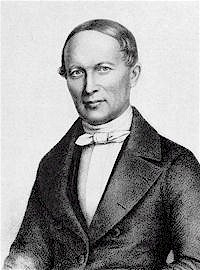
Friedrich Silcher


|
Silcher was a preeminent composer, poet, editor, music teacher, director, and preserver of German folk song and traditional choral music.
Philipp Friedrich Silcher was born on June 27, 1789, in a schoolhouse in the wine area of Schnait in Remstal, a son of the teacher Karl Johann Silcher. As a teenager in 1803 he began a three-year apprenticeship as "Schulknecht" to Ferdinand Auberlen in Fellbach, who was well known as a good musician and valued arranger of men's choral music. In 1806 he became a teaching assistant in Schorndorf, where he also was a tutor in the house of the Kreishauptmann Freiherr von Berlichingen. In 1809 Silcher moved to Ludwigsburg and took a position at the Ludwigsburger School for Girls. At that time Ludwigsburg was a temporary Fürstenresidenz, where the composers Carl Maria von Weber and Konradin Kreutzer also had been staying. Both of them advised Silcher to devote his life to music. Shortly after Kreutzer moved to Stuttgart, Silcher followed him and became a music teacher. During his two years in Stuttgart Silcher lived with the p ianobuilder Schiedmayer. At this time Silcher devoted himself primarily to the music of Mozart. In 1817 Silcher became Musikdirektor at the University of Tübingen. In 1822 he married Luise Enslin, the daughter of a Tübingen merchant. She bore him two daughters and a son. In 1829 Silcher founded the Tübinger Akademische Liedertafel, which he conducted for 30 years. Silcher's musical legacy is great. Among these are Ännchen von Tharau, Am Brunnen vor dem Tore (setting based on a melody by Franz Schubert), Hab' oft im Kreise der Lieben (Frisch gesungen), Ich weiß nicht, was soll es bedeuten (Die Lorelei, the poem by Heinrich Heine), In einem kühlen Grunde (the poem by Joseph von Eichendorff), Jetzt gang i ans Brünnele, Muß i' denn zum Städtele hinaus, Rosestock, Holderblüt, So nimm denn meine Hände, Wenn alle Brünnlein fließen, and many others. During his lifetime Silcher was already recognized for his contributions. In 1852 the University of Tübingen honored him with the title "Doctor of Philosophy." On June 8, 1867, Silcher was made an honorary member of the Schwäbischer Sängerbund. On August 26, 1860, Silcher died. On September 22, 1912, the Schwäbischer Sängerbund dedicated the Silchermuseum in Schnait. The coveted Friedrich-Silcher-Preis was dedicated in 1993 "zur Erinnerung an den Komponisten, Chorleiter und Musikpädagogen Philipp Friedrich Silcher." With a monetary value of DM 15,000 it was to be awarded every three years. The prize was awarded in 1995 for the first time by the Kulturamt of the city of Weinstadt. |

